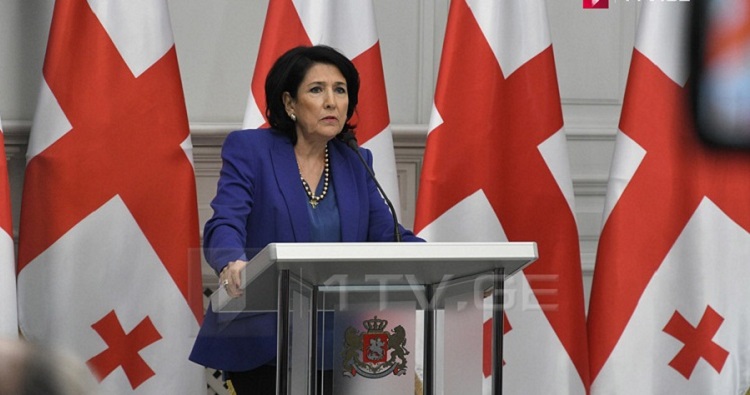President Zurabishvili: we have not been able to support residents of occupied Tskhinvali during the coronavirus outbreak

Georgian President Salome Zurabishvili also mentioned that with its “absurd” restrictions of access for Georgian authorities to aid citizens in the Tskhinvali region, Russia had created new risks in the occupied areas. Photo: 1TV.ge.
In an interview with the Financial Times, Georgian President Salome Zurabishvili stated that the Georgian government has not been able to give support to the residents of the Russian-occupied Tskhinvali (South Ossetia) region during the Covid-19 outbreak.
We have not been able to give all the support we could have given. On the contrary, the separatist authorities were more tense in their relations and more eager to control everything. On the Russian side we have not seen any evolution either: we haven’t seen much transparency there in terms of what is happening with the pandemic”, said Zurabishvili.
Zurabishvili also mentioned that with its “absurd” restrictions of access for Georgian authorities to aid citizens in the Tskhinvali region, Russia had created new risks in the occupied areas.
The Georgian Ministry for Reconciliation and Civil Equality states that the closure of the crossing points connecting the region with the rest of Georgia have already led to 14 deaths in Tskhinvali region due to the delayed medical aid.
On May 20, 2020, Jumber Miladze died while being transported to a hospital on Tbilisi-controlled territory from the Akhalgori district of the Russian-occupied Tskhinvali region. Miladze’s family members had tried several times to transfer him to Tbilisi-controlled territory, though initially they were several times refused by the de-facto regime of Tskhinvali to receive appropriate medical service.
The Russian-controlled Tskhinvali closed its last crossing point connecting the region with the rest of Georgia on February 27, 2020 ‘to prevent the spread of coronavirus’.
 Tweet
Tweet  Share
Share